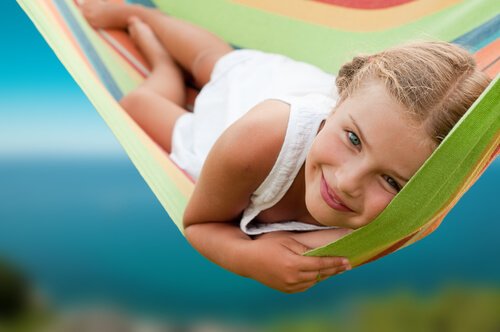4 Activities to Promote Self-Awareness in Children

As parents we want our children to grow into emotionally balanced adults. To achieve this, we must provide them with the necessary tools to face difficult situations and recognize their abilities, qualities, weaknesses and strengths. Self-awareness is the ability to identify feelings, emotions and actions.
Developing this quality not only helps children connect with themselves, it also allows them to understand that their actions have consequences both for themselves and for others.
In this article we’ll teach you how to foster self-awareness in your children.
What is self-awareness?
It’s an important quality that everyone should develop and it consists of having knowledge about one’s self. In other words, it’s being aware of one’s feelings, moods, limitations, strengths and abilities.
When people are self-aware, they’re able to understand the triggers that provoke certain actions. This allows them to have a well-defined concept of themselves. Therefore, self-awareness is an excellent tool for parents to provide for their children.
When should you start promoting self-awareness in your child?
It’s wise to start from an early age (around two years old). Developing this quality will be useful for the rest of the child’s life. Therefore, try to start as soon as possible when it comes to helping your children identify their emotions.
“Self-awareness is the ability to identify feelings, emotions and actions.”
4 activities to promote self-awareness in children
The main objective of this exercise is for children to develop self-awareness and for them to practice it for the rest of their lives. It’s important for their knowledge about self-awareness to be permanently stored in their minds.
One way to achieve this is through certain activities. Here are a few examples:
Manual of the heart
Since the heart is the center of feelings, we should listen to it. Try to help your children differentiate between different emotions and accompany them to discover new ones.
- What does this activity consist of? Draw, paste or trace different situations on a sheet of paper that your child can identify with. It could be a park, family, the beach or mountains. On each sheet, draw a face without gestures so that the child can draw the emotions they feel while confronted with different situations.
- Developing the activity. Allow the child to visualize each sitatuation. You can narrate to the child what is occuring in each scenario in order for them to develop a full mental image. Then, finally, ask the child to draw a face on the paper.
- What does this activity achieve? The goal of this activity is for the child to identify different emotions that could be caused by different situations. It promotes self-awareness and allows the child to express his feelings. It also promotes interaction between parents and their children.

Reciting stories
Reciting stories is a big part of almost all cultures. Even from an early age, children have many stories to tell.
- What does this activity consist of? Choose a story or adapt one according to your child’s personality. Narrate the events, bringing life into each character and experience using pauses, suspense, exclamations and changes in tone. The idea is for children to immerse themselves in the story.
- Developing the activity. Find a calm space and tell the chosen story, emphasizing certain points so that the children can assimilate and process everything they hear. After finishing the story, you can ask them what they liked, what made them happy, what made them sad and what they would like to change about the story.
- What does this activity achieve? The goal of this activity is to free your children’s internal emotions. You’ll be able to help them develop empathy. This activity is intended to encourage children to meditate on different scenarios. Encourage them to think about what they would do differently.
My letter
As individuals we’re sometimes concerned about what we project to others. In other words, we sometimes worry about the way other people see us. To promote self-awareness in your children, try the following activity:
- What does this activity consist of? You can involve other family members in this activity. Each participant should have a pencil and paper, and think about positive things about the other participants. The objective is to write down these positive characteristics.
- Developing the activity. Each participant sticks a sheet of paper on their back and the others should write down the positive qualities they see in that person. At the end of the activity, everyone reads what was written on their back.
- What is expected to be achieved? This activity promotes interaction between the child and other family members. The goal is for them to meditate on how they feel in relation to others and for them to be able to express their feelings by writing them down. It also helps children have an idea of how others see them.

Express myself with expressions
One of the ways that human beings express themselves is through gestures and facial expressions. Since your goal is to develop self-awareness in your child, it’s important to work on this aspect.
- What does this activity consist of? In situations where they cannot talk, there are other ways to express their feelings. This is another important element of self-awareness.
- Developing the activity. Make cards with words or phrases on them and divide the children into two groups. Each group should pick a member to mime what is written on their card. You can help out by giving ideas on what gestures to perform. This activity will also allow them to recognize their abilities and limitations.
- What is expected to be achieved? This activity helps children express themselves. It favors interaction between parents and children. Another benefit of this activity is that it incentivizes connections with others.
In conclusion, self-awareness is an important quality that you should help your child develop. It’s your responsibility as a parent to know what it means, implies and the tools you can use to help them develop it.
These 4 activities that foster self-awareness will allow them to recognize their strengths and weaknesses. It will also allow them to identity which situations trigger certain emotions and how they’re perceived by others.
All cited sources were thoroughly reviewed by our team to ensure their quality, reliability, currency, and validity. The bibliography of this article was considered reliable and of academic or scientific accuracy.
- Campo, L. (2014). El desarrollo del autoconcepto en niños y niñas y su relación con la interacción social en la infancia. Psicogente, 17(31), 67-79. Disponible en: http://www.scielo.org.co/scielo.php?script=sci_arttext&pid=S0124-01372014000100005
- Chernicoff, L. y Rodríguez, E. (2018). Autoconocimiento: una mirada hacia nuestro universo interno. Didac, (72), 29-37. https://biblat.unam.mx/es/revista/didac/articulo/autoconocimiento-una-mirada-hacia-nuestro-universo-interno
- Flores, M. (2014). Aplicación de un programa de habilidades psicosociales basado en el autoconocimiento para fortalecer las relaciones interpersonales de los niños y niñas de tercer grado de primaria de la I.E.P. Marvista, Paita, 2013 [Tesis de Maestría, Universidad de Piura]. Repositorio Institucional PIRHUA. Disponible en: https://pirhua.udep.edu.pe/handle/11042/1981
- Haeussler, I. y Milicic, N. (1995). Confiar en uno mismo: Programa de desarrollo de la autoestima. Editorial Catalonia.
- Melendo, M. (1993). En tu centro: el enneagrama un método de autoconocimiento, autoaceptación y mejora de las relaciones interpersonales. Editorial Sal Terrae.
- Navarro, M. (2009). Autoconocimiento y autoestima. Revista Digital para Profesinales de la Enseñanza (5), 1-9. Disponible en: https://www.feandalucia.ccoo.es/indcontei.aspx?d=3745&s=5&ind=178
- Pineda, N. y Urrego, N. (2017). Autoconocimiento emocional, una necesidad en la infancia contemporánea [Trabajo de posgrado, Fundación Universitaria Los Libertadores]. Repositorio los libertadores. Disponible en: https://repository.libertadores.edu.co/handle/11371/1145
This text is provided for informational purposes only and does not replace consultation with a professional. If in doubt, consult your specialist.
